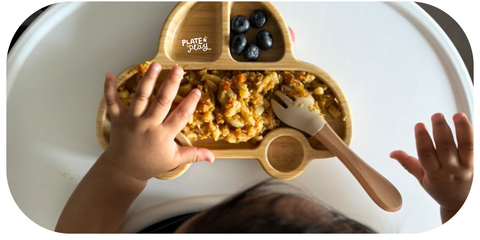Contrary to popular belief, recent research suggests that introducing common food allergens—such as seafood, peanuts, soy, wheat, and dairy—early on can actually help reduce the risk of developing allergies later in life. This might sound contradictory, but let’s explore how to approach allergen introduction through 3 simple questions.
What to introduce? Most pediatricians recommend starting to introduce major allergens around 6 months of age, with the goal of including as many as possible by your baby’s first birthday. The key to success? Introduce one new allergen at a time. This method makes it easier to pinpoint any potential reactions. Start with a small amount and gradually increase it, while keeping a close eye on how your baby responds. If there’s a reaction, you’ll know exactly what caused it, which makes managing it much simpler and less stressful.
When to introduce? When you introduce allergens, timing matters. Choose a day when your baby is healthy—no fevers, runny noses, or coughs—so you can tell the difference between an allergic reaction and a common illness. It’s best to try new foods earlier in the day, as most reactions happen within two hours. This gives you plenty of time to monitor your baby and seek medical advice if needed, helping you feel more prepared and at ease to respond promptly should any issues arise.
How much to introduce? Introducing allergens shouldn’t be a one-time event! Think of it like introducing new flavors and textures. Regular, consistent exposure helps your baby build tolerance over time. A small amount is enough for exposure, and once your baby has tolerated an allergen, try to incorporate it into their diet regularly. This ongoing exposure not only minimizes the risk of allergies but also helps create a well-rounded diet.
Additional Tips for a Smooth Introduction:
🌟 Keep a Food Diary: Track what allergens you introduce, the amounts, and any reactions your baby may have. This record can be invaluable if you need to discuss concerns with your pediatrician.
🌟 Allergy Testing: If you have a family history of allergies or concerns about specific allergens, consult your pediatrician. They might recommend allergy testing or a more tailored approach.
🌟 Patience and Observation: Every baby is unique, and their responses to new foods can vary. Be patient and attentive, and adjust your approach as needed based on your baby’s reactions.
Introducing allergens can seem daunting, but it’s a crucial step in your baby’s journey with food. Embrace this process with curiosity and confidence, knowing you’re building a strong foundation for their future health and well-being.
Enjoy these moments of discovery, and remember, we’re in this together! 💚
Note: The information provided is general and meant for informational purposes. Always consult with your pediatrician before introducing new allergens, especially if your baby is at high risk for allergies.






Comments (0)
There are no comments for this article. Be the first one to leave a message!